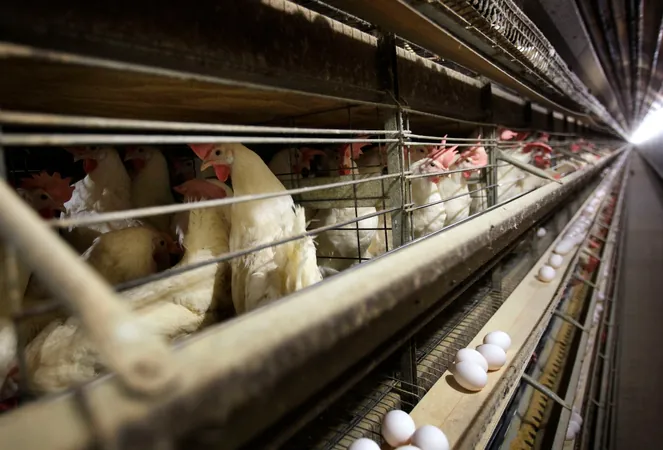
Alabama's Bird Flu Outbreak: Over 100,000 Chickens Deceased - What You Need to Know!
2024-12-16
Author: Yan
Overview of the Outbreak
In a shocking development from Alabama, the state has confirmed the presence of highly pathogenic avian influenza (HPAI), leading to the slaughter of over 100,000 chickens. This drastic move was taken at a commercial broiler farm in Cullman County and a backyard flock in Pickens County after positive tests were obtained at the Alabama State Diagnostic Laboratory in Auburn.
Currently, both affected locations are under strict quarantine. Approximately 116,000 broiler chickens in Cullman and a smaller group of 70 assorted birds in Pickens County, including guineafowl, ducks, and turkeys, have been culled to halt the spread of this virulent strain of bird flu.
The alarming situation has prompted a thorough testing and monitoring protocol for all poultry within a 6.2-mile radius of the broiler farm. Agriculture Commissioner Rick Pate and State Veterinarian Dr. Tony Frazier have emphasized the urgency for all poultry operations—both commercial and backyard—to remain vigilant and closely monitor their birds' health.
What Does This Mean for Poultry Owners?
The detection of HPAI underscores the critical need for enhanced biosecurity measures among poultry owners. The authorities have advised keeping birds confined, away from wild birds and other domestic flocks, to minimize exposure to the virus. Some common signs of HPAI that poultry owners should be on the lookout for include:
- Sudden spikes in mortality rates within the flock
- Respiratory issues like sneezing and coughing
- Gastrointestinal distress indicated by watery, green diarrhea
- Noticeable lethargy and reduced appetite
- Declines in egg production, alongside abnormalities in the eggs
- Physical symptoms such as swelling and discoloration of the head and combs
Protecting Your Flock: Essential Biosecurity Steps
The Alabama Department of Agriculture urges all poultry stakeholders to ramp up their biosecurity protocols. Important measures include:
- Thoroughly cleaning vehicles and poultry-related equipment
- Restricting access to unnecessary visitors
- Maintaining sanitized foot baths for incoming shoes
- Changing clothes upon handling birds
The Centers for Disease Control and Prevention (CDC) has stated that while bird flu poses a low risk to human health, it remains highly contagious among avian species. Therefore, anyone who encounters sick or deceased birds, whether domestic or wild, should wash their hands thoroughly and change clothing before contacting other poultry.
If you spot any sick or dead wild birds, promptly report your findings to the Alabama Department of Natural Resources and Conservation at 334-242-3469. For domestic birds, contact the Agriculture Department’s Poultry Unit at 334-240-6584.
As the situation unfolds, staying informed and proactive is crucial in protecting both your poultry and public health. Keep your family, your business, and your feathered friends safe!


 Brasil (PT)
Brasil (PT)
 Canada (EN)
Canada (EN)
 Chile (ES)
Chile (ES)
 España (ES)
España (ES)
 France (FR)
France (FR)
 Hong Kong (EN)
Hong Kong (EN)
 Italia (IT)
Italia (IT)
 日本 (JA)
日本 (JA)
 Magyarország (HU)
Magyarország (HU)
 Norge (NO)
Norge (NO)
 Polska (PL)
Polska (PL)
 Schweiz (DE)
Schweiz (DE)
 Singapore (EN)
Singapore (EN)
 Sverige (SV)
Sverige (SV)
 Suomi (FI)
Suomi (FI)
 Türkiye (TR)
Türkiye (TR)